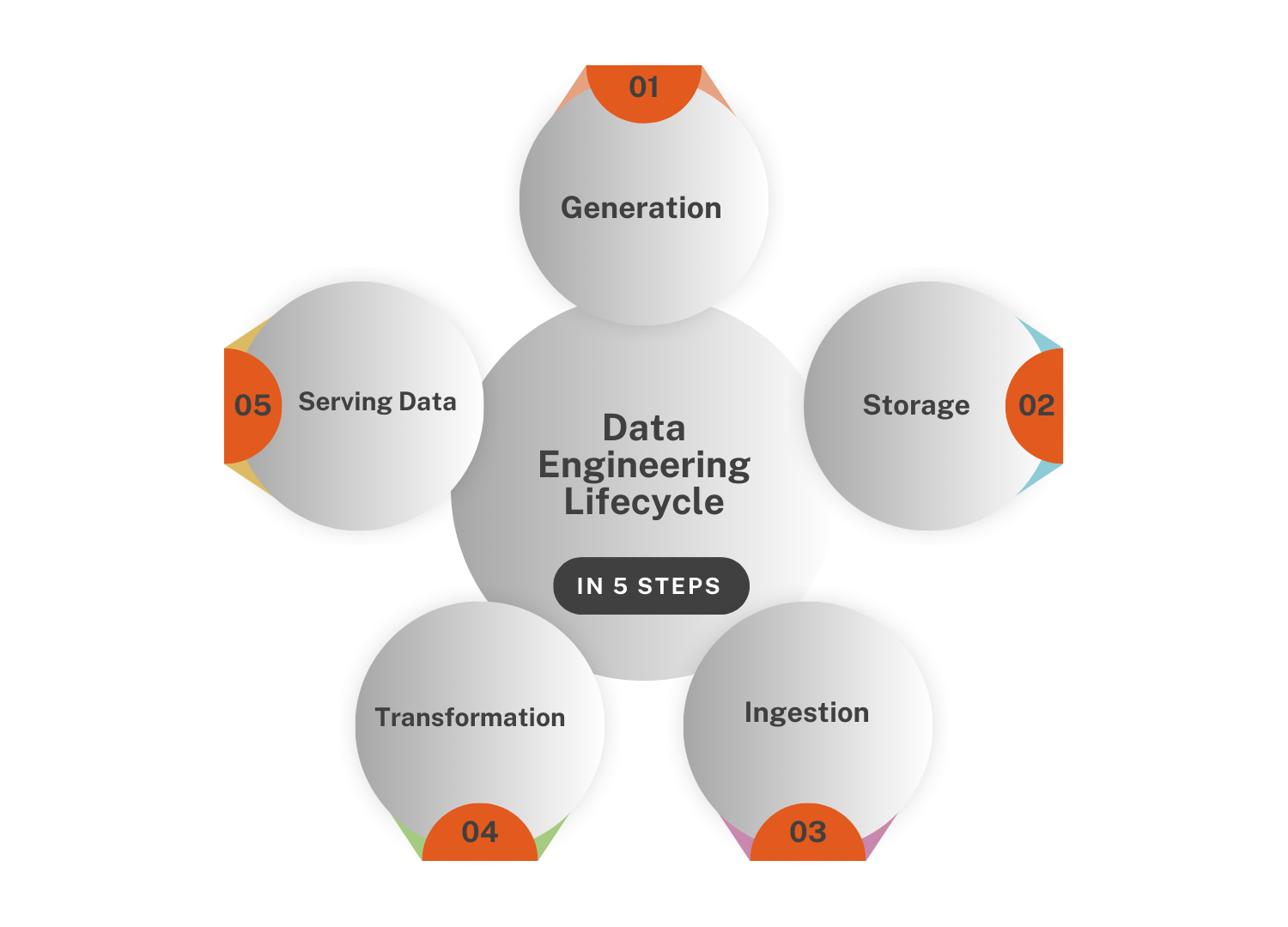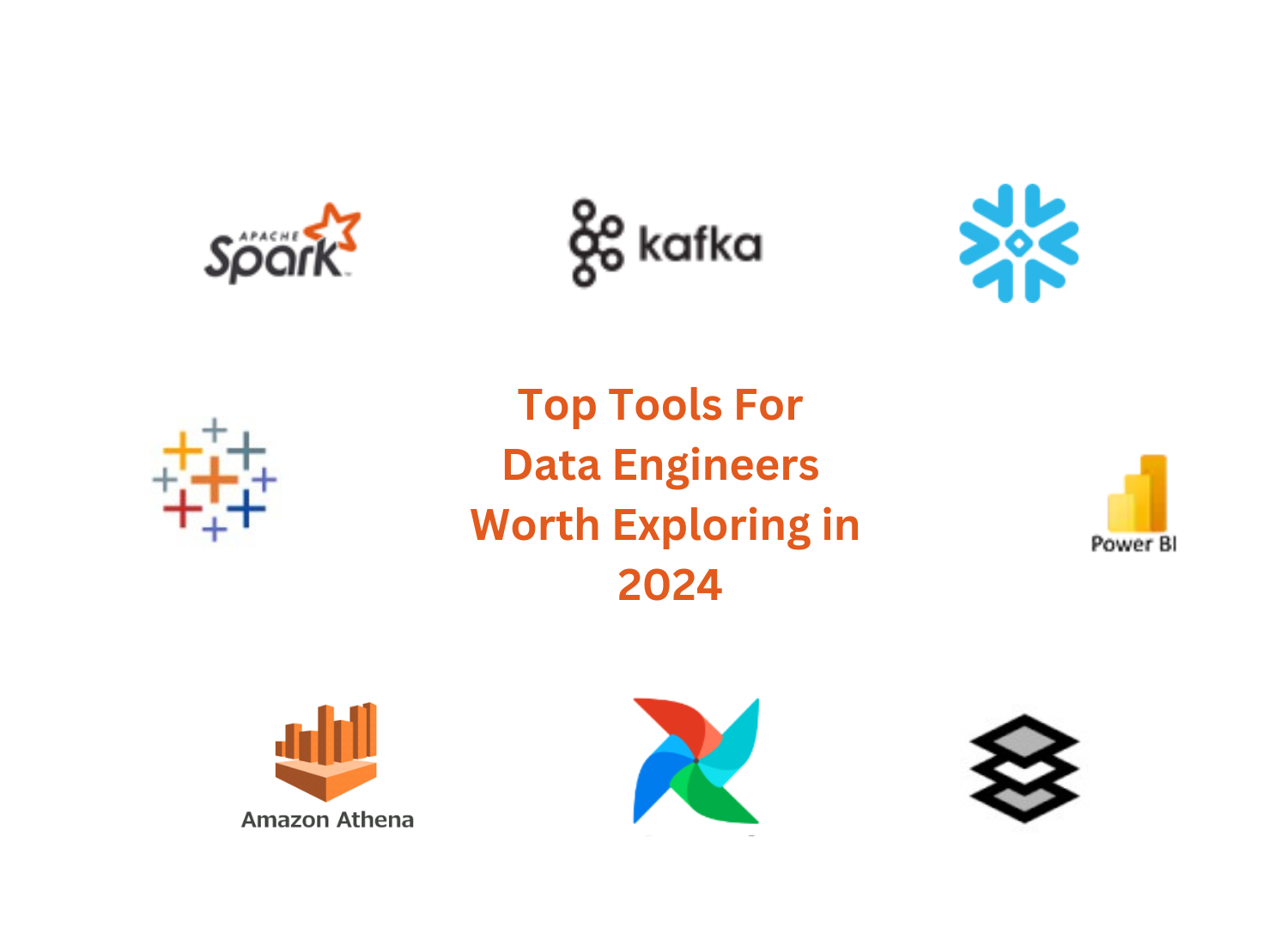Table of Contents
Many digital transformation initiatives are propelled by data-driven decision-making and creativity. Businesses that don’t manage the risk associated with their data will lag behind their rivals who are making good use of data. The strategic business benefits that businesses receive from using data engineering to make informed decision-making are covered in this blog post on the future of data engineering. Adopting new technologies and radically altering how companies function and provide value to customers are both parts of data engineering. This frequently entails boosting consumer experiences, streamlining internal procedures, and developing fresh business models made possible by data and technology. According to predictions, the worldwide big data industry is expected to rise significantly, reaching USD 401.2 billion by 2028, growing from USD 220.2 billion in 2023.
Many businesses have made significant investments in digital transformation over the last ten years. This is important to remain relevant and competitive in quickly changing industries. As a result of these efforts, enterprises are now using cloud computing services, big data analytics, and artificial intelligence. They are making use of other technologies that facilitate more efficient data collection, processing, and analysis.
What is Data Engineering precisely?
Data engineering entails a full range of procedures designed to manage the data lifecycle. This ranges from the gathering and storing of raw data to its processing and analysis. The unseen architects are the data engineers who build reliable, scalable, and effective data pipelines. They feed into business intelligence and analytics software, enabling well-informed strategic planning and decision-making.
Data engineering solutions encompass several important procedures:
Data collection:
This involves compiling information from a range of sources. These sources include social media, IoT devices, and internal databases. Fluentd and Apache Kafka are two popular technologies. These are used for ingesting data in real time from a variety of sources.
Data Storage:
Creating scalable, performance-optimized, and secure data lake solutions. Cloud-based solutions are provided by platforms like Google BigQuery, Amazon Redshift, and Snowflake. These cater to the extensive data requirements of contemporary enterprises.
Data processing:
This is the process of converting unstructured data. This data is converted into a format that is validated, cleaned, and categorized. Two essential technologies for big data technology are Apache Spark and Apache Hadoop, which provide strong frameworks for effectively managing enormous datasets.
Data analysis:
This is the process of extracting insights. This data is taken from data using machine learning algorithms and advanced data analytics to guide corporate strategy. Data may be transformed into actionable insight with the use of data engineering tools like TensorFlow for machine learning models. For data analysis systems like Tableau, Power BI, and Looker are used.
These procedures are essential for converting unprocessed data into knowledge that can be put to use, allowing companies to realize the full benefits of their digital transformation initiatives. Businesses may increase operational efficiency, improve consumer experiences, and stimulate innovation with the correct data engineering tools and techniques.

The Strategic Data Engineering Business Value
However, digital transformation and data engineering is a continuous process rather than an isolated occurrence. Businesses have to innovate and adjust to new opportunities and technological advancements constantly. This calls for a culture of constant development as well as an unwavering dedication to using technology and data to propel commercial success. The effects of data engineering solutions on several facets of an organization’s operations and strategic goals can be used to understand the business value of data engineering. The following are some salient points:
Consolidation and Integration of Data
Data integration from many sources, such as databases, apps, and outside sources, is made easier with the help of data engineering solutions. Better decision-making and operational efficiency are made possible for organizations by being able to develop a unified picture of their data. To preserve quality and consistency, data engineering procedures make sure that data is cleansed, converted, and standardized. As a result, data-driven insights become more reliable, and costly mistakes brought on by erroneous or inconsistent data are reduced.
Data Accessibility and Availability
Data engineering tools give people the power to use data when they need it, rather than just making sure it’s available. Employees at all organizational levels are free to use data as a driver for performance and creativity, allowing for real-time decision-making.
Performance and Scalability
By using data engineering consulting services, businesses can expand their data architecture to accommodate growing amounts of data and intricate analytical tasks. Scalability helps firms expand by extracting value from data.
Economy of Cost
Data engineering service providers assist businesses in lowering the expenses associated with manual data administration and processing by automating procedures and streamlining workflows. This represents resources that could be moved to more strategic projects.
Adherence to Regulations
By ensuring that data is handled and kept securely, data engineering tools assist organizations in adhering to data protection laws and standards. This lowers the possibility of data breaches and the resulting damage to one’s reputation and legal standing.
Assistance with AI and Advanced Analytics
Because data engineering makes it possible to collect and analyze huge and complicated datasets, it lays the groundwork for sophisticated analytics and artificial intelligence. This stimulates creativity and offers insightful information.
All things considered, a data engineering solution is essential to realizing the full potential of their data and generating corporate value through enhanced decision-making, increased operational effectiveness, and creative thinking.
Transform Your Data Into a Valuable Strategic Asset
Data Engineering’s Advantages for Businesses
Data engineering consulting services are very important for digital automation, as they are for all businesses. It makes effective data analysis possible for both ongoing operations and long-term forecasts. In the end, it helps the business continue to succeed. Gathering data is simple, but it is meaningless without understanding and consistency.
The role of data engineers is to analyze data and communicate their findings to different decision-makers. One of the main duties of data engineering is this. Decision-making can be considerably accelerated by the availability of accessible and actionable corporate intelligence. In comparison to improper data solutions, it can operate five times faster.
The idea that data plays a significant role in corporate operations is not new. Its crucial significance is frequently misunderstood to be synonymous with other roles that are fundamentally distinct. Thus, it is essential to pause and recognize the distinctions between these essential components. The creation of a consistent and organized data flow is the main objective of data engineering. It makes the development of data-driven models, such as machine learning and data analysis, easier. Sadly, a lot of businesses keep a lot of data without having a clear plan for how to use it. It means that this data’s potential is still unrealized.
To make data science techniques more efficient, data engineering is essential. The following are the main advantages of data engineering for companies:
1. Assisting in Better Decision Making
Businesses that strategically apply data-driven insights into their decision-making process might attain superior results. By making it easier to identify important customer or product categories, data engineering companies enable more focused and accurate marketing initiatives. Since businesses may model several product and pricing offering scenarios to scale customer demand, it results in more successful advertising and marketing strategies.
Data engineering companies who have access to sales data for the modified items can assess the effectiveness of the adjustments and share their results with decision-makers. After that, the business can decide whether or not to implement these adjustments across the board. Both conventional business intelligence tools and contemporary machine learning technology can provide deeper insights into the tastes and behavior of consumers.
Furthermore, through the continuous collection and analysis of fresh data, cutting-edge technologies can support businesses in staying competitive in the face of shifting market changes and trends.
2. Examining the Results of Choices
In the erratic market of today, it is critical to assess the effectiveness of earlier choices. More data is produced by every data-driven choice. Data engineering is an essential skill because it will help refine the future of data-driven decisions through regular examination. The most effective use of data is made possible by a thorough analysis that permits ongoing improvement.
Businesses can make better decisions when they take the audience’s interests into account. Time and resource savings are another outcome. In data science, self-improvement is an ongoing process. It results in an evaluation of the consequences of previous choices. Without self-reflection, the process is still not complete. After this is accomplished, making decisions with data is easier and more deliberate.
3. Forecasting the User Tale to Enhance the User Interface
A company’s products have a major role in determining its survival and success. Finding new growth prospects calls for further investment, and data engineering is essential in this process. The goal of the product management team’s strategic decision-making process for upcoming innovations, services, and products is to constantly monitor market trends and recognize patterns.
Businesses may effectively predict and anticipate market behavior by utilizing machine learning-based forecasts. The method makes use of past data and trends that could go unnoticed by people. Businesses should rely more on using relevant big data technologies that are accessible for analysis to measure product success, follow customer feedback, and keep an eye on their competitors.
4. Fresh Business Prospects Recognition
Products are the foundation of any business. It frequently requires a large financial commitment. Data engineering solutions are a vital component in helping businesses find new prospects. The product management team’s job is to find patterns that inform the strategic roadmap for innovative solutions, new services, and offerings.
One of the most powerful features of machine learning is its predictive capacity. Machine learning algorithms examine historical data to identify patterns that are beyond human comprehension and forecast future trends and market behavior. Companies are recognizing and anticipating the market needs to stay competitive.
In today’s environment, businesses cannot stay ahead of the curve by relying only on intuition. Businesses need to use data and customer feedback to track customer sentiment and product performance. For staying in the game, customer feedback is gaining importance.
The Role of Data Engineering in Data-Driven Innovation and Decision-Making
To fully use the data, organizations are making large investments in digital transformation. This entails shifting to cloud computing, implementing agile procedures, and reorganizing roles and objectives to be more informed by data.
Change in Focus
Rather than merely protecting data, data executives are now concentrating on generating concrete value from it. This is indicative of a larger movement that sees data used as a strategic tool to accomplish organizational goals.
Encouraging Data Engineering Teams
The role of data engineers is to maximize the potential of data. Data leaders understand how critical it is to encourage data engineering teams. These groups play a critical role in developing the pipelines and infrastructure needed for data-driven decision-making.
Importance of Data Engineering
The role of data engineers according to some, data engineers play a “catch-all data role” that is crucial to the advancement of data science and analysis. Their efforts in constructing pipelines and infrastructure are essential for providing data to users farther down the line and setting the stage for analytics.
Poll Results
StreamSets’ poll offers information on how business professionals and data engineers view the influence of data engineering on financial outcomes. Organizations can use this knowledge to position their data engineering teams for success in a value-driven environment.
Data engineers are more likely to feel empowered and fulfilled when they are involved in business units and objectives. They can supply higher-quality data more effectively because of this connection, which is advantageous to the company. But to reach this degree of integration, adjustments must be made to metrics, mentality, processes, and communication.
Enterprises can fully realize the promise of the future of data engineering and turn it into a generator of business value by integrating data engineers into strategic choices and objectives. This change yields better results and raises data engineers’ effectiveness and satisfaction levels inside the company. As was previously mentioned, the future of data engineering is essential to realizing the full potential of data, empowering businesses to make wise decisions, boosting productivity, and encouraging creativity.
Advantages of Data Engineering
Because it makes data administration and utilization dependable, efficient, and successful, data engineering is essential to modern enterprises. The following are some main advantages of data engineering solutions:
1. Improved Determination
Data engineering gives firms the ability to make well-informed decisions based on precise insights by organizing and supplying high-quality data. This results in enhanced tactics, enhanced comprehension of customers, and maximized operational effectiveness.
2. Enhanced Productivity
Errors are decreased and manual labor is utilized less when data collection, transformation, and integration activities are automated. Processes are streamlined by data engineering consulting services, which increases overall productivity by making data processing faster and more dependable.
3. Flexibility
Frameworks and architectures for data engineering are made to be able to manage operations that need to be scaled up or down. This makes it possible for companies to successfully handle data expansion without incurring more costs or using more resources.
4. Higher-quality data
Keeping data accurate, thorough, and reliable is one of data engineering’s main goals. By cleaning, deduplicating, and standardizing data, data engineering tools and technologies improve the quality of data utilized for data analytics and business operations.
5. Superb Data Interpretations
Businesses can use increasingly sophisticated analytical methods and technologies, such as AI and ML if they have strong data pipelines and structures. They can learn more in-depth and complex things about their markets, operations, and consumer behavior as a result.
6. Improved Data Management
Implementing governance controls to guarantee data compliance with internal standards and regulatory requirements is one of the techniques of data engineering. This is essential for preserving client trust and safeguarding sensitive data.
7. Financial Gains
Saving money on data processing, retrieval, and storage is possible with effective data management. Businesses can minimize needless data replication and improve resource usage by streamlining data flows and system optimization.
8. Processing Data in Real Time
Real-time data processing skills, which are necessary for time-sensitive applications like fraud detection, real-time customization, and dynamic pricing, are made possible in the future of data engineering. Both operational agility and customer experiences can be greatly improved by this quick response.
9. Integration of Data
The integration of various data sources is made easier with the help of data engineering. A more complete perspective of the business landscape is provided by this integration, enabling more thorough data analytics and reporting.
10. Assistance with Innovation
Businesses may more readily experiment with new technologies, data-driven products, and business models when they have a strong foundation in data engineering. This encourages creativity and may result in the creation of fresh sources of income.
11. Proactive Management and Predictive Analytics
Predictive analytics solutions, which can foresee trends, user behavior, and possible system faults, are made possible by advanced data engineering. Businesses may be proactive rather than reactive thanks to this predictive power handling problems before they get out of hand and taking advantage of opportunities faster.

Where Will Data Engineering Go in the Future?
The ability to scale data effectively and less painfully will be a key component of the future of data engineering. Data management problems won’t provide as much of a hurdle to businesses in the future.
During the transitional period, when data is available in pipeline and warehouse-oriented formats, the data engineering function has been crucial. Within the next five years, the future of data engineering will become automated. Data will eventually be produced. The data gap that exists between users and enterprises will close as a result. The need for cloud computing solutions and hybrid data infrastructures will have a significant impact on the future scope of data engineering. Data engineers will specialize more and provide businesses with a wide range of services.
Data Roles Will Be Allotted a Board Position
In the early stages, data was pretty basic. As of today, there are no senior positions for data roles. However, with the rising need for quickly sorting and condensing data is gaining importance. This is calling for higher-level data engineering positions in businesses. Senior management knows the value of quantitative statistics and their role in supporting decision-making. Data-driven roles are now in front of the board-level seat since data engineers will take over the work of data scientists.
Committed Data Engineering Assistance for Each Team
In the future, it will play a significant role. By this point, all organizations have gotten it. Data provides a rapid understanding of the company, enabling informed decision-making. A good example of the role of a data engineer is to gather and analyze data in an organization in the sales department.
In a sales department, where it is necessary to examine the customer’s raw data to comprehend their thoughts. By employing the appropriate metrics, data engineers assist in adding value to the data and encourage users to remain on the platform. Data loss can be avoided by establishing the proper data flow, which allows for easy future direction planning and identification of client behavior. For this reason, we can state that data engineers are crucial to any kind of business.
Data Issues Will Be Solved by More “Unicorns”
Every industry needs data engineers. For this reason, it wouldn’t be incorrect to state that there is a high demand for brand-new unicorns. Learning the specialized skill set is essential for anyone hoping to work as a data engineer. Data engineers, sometimes known as “Unicorns,” perform tasks like pipeline-based data modeling, data analysis, and insight extraction. The mastery of intricate skill sets is crucial for them.
The two unicorns on the list that have done the best over the past five years are Snowflakes and Databricks. These two businesses found solutions for data storage issues. The segment is a different company that collects vast amounts of data. And it doesn’t end here. New unicorns will join the data sector in the future of data engineering. As a result, we can predict that more unicorns will arrive in the future of data engineering to help with data problems.
Data Transport Technology Will Become Commoditized
Data commoditization entails relocating and safeguarding data locations. Furthermore, once cloud computing technology became available, the need for transporting data has increased significantly. The future of data engineering was exclusive to dollar-billion firms during a period when data transferring was a cost for businesses.
However, everything has become simple thanks to cloud computing technology, which allows for remote access or on-site data loading to servers. SaaS providers enable cost-effective, flexible data utilization. As a result, cloud solutions are used by more than 50% of businesses to handle their data demands, which contributes to commoditization. Thus, big data technology is becoming more and more commodity-like.
Infrastructure Operating in Real Time Will Become Common
Currently, nonetheless, the future of data engineering appears to be unstable due to the existence of useless merchants on data customer platforms. The platforms, which are only business solutions, are the unethical means of reaching and monitoring client journeys. because there aren’t many real-time infrastructures.
Since real-time infrastructures are still in their infancy, businesses are concentrating on creating custom solutions, which come at a high cost and demand a great deal of labor. Custom data infrastructures, which will increase the role of real-time data pipelines to build products with cloud platforms, will require ten more years to implement.
In summary
Data engineering is expected to play an ever more crucial and strategic role. Especially in promoting efficiency and innovation in companies in the future of data engineering. To handle the rapidly growing amounts of data. this will become important. This data is produced by digital interactions, Internet of Things devices, and automated systems, data engineering. It guarantees the availability of clear, organized, and timely data. This data is necessary for building precise and efficient models—it will support advances in AI and ML. Furthermore, in the future data engineering will make real-time analytics and decision-making possible which will give companies the ability to react quickly to shifts in the market and client demands.
Data engineers will be faced with creating more robust, scalable, and adaptable data structures. This was to meet the increasing demands of hyper-connected, internationally dispersed, and always-on digital services. As businesses continue to place a high priority on data-driven strategies. Furthermore, the future of data engineering will incorporate stricter governance and compliance procedures. This is to guarantee that data usage complies with legal and ethical criteria. This is a given due to the growing significance of data privacy and security. The future of data engineering is closely linked to the next stages of technology advancement and corporate competitiveness.
The future of data engineering is going to be driven by technological developments. These include AI and ML, real-time data processing, and strong data governance. These developments maximize operational effectiveness. Presenting enterprises with never-before-seen chances to use data in creative ways. This is a quickly developing discipline. Staying ahead demands a thorough comprehension of fundamental ideas and state-of-the-art methods.
Join hands with A3Logics to take the first steps toward realizing the business-boosting potential of your data
How can A3Logics help?
At A3Logics, we are aware of how crucial the future of data engineering is to companies undergoing digital transformation. We offer an all-inclusive range of data engineering services. This is to enable businesses to efficiently gather, handle, and evaluate data to produce valuable business insights.
We assist our clients in establishing reliable data pipelines, ensuring data quality and dependability, and building strong data infrastructure by utilizing state-of-the-art technology and best-in-class processes. Our skilled data engineers collaborate extensively with companies. They comprehend their particular goals and difficulties before creating solutions that are specifically designed to produce noticeable outcomes.
A3Logics, an artificial intelligence solutions company, is dedicated to providing businesses with the knowledge and resources necessary to thrive in the data-driven age. Even as they traverse the complexity of the digital world. Organizations may take advantage of fresh opportunities. We spur innovation and maintain a competitive edge in the market by utilizing our data engineering services.
Allow us to assist you in transforming your data into a valuable strategic asset. The data spurs development, creativity, and change. Get in touch with us right now to see how our data engineering services can help your business prosper in the digital era.
FAQ
-
Is there still a need for data engineers?
Yes, as data-driven decisions become more and more important, there is a great demand for data engineers. For creating, overseeing, and improving data pipelines, organizations require data engineers.
-
Why should I stay current with trends in data engineering?
By keeping up with data engineering trends you can be inventive and competitive. It makes it possible for you to use new techniques and technologies to increase productivity. Improve the quality of your data, and facilitate more complex data analysis.
-
How can my business profit from knowing data engineering trends?
Gaining an understanding of data engineering trends enables your company to implement innovative techniques and technologies that maximize data processing and analysis. This can result in increased operational effectiveness, enhanced customer insights, and a faster capacity to adjust to changes or disruptions in the market.
-
Does developments in data engineering only apply to digital companies?
No, trends in data engineering apply to all industries using data. Although computer businesses are at the forefront, data engineering innovations also have a substantial positive impact on other industries, including healthcare, finance, marketing, and logistics.
-
How does AI impact data engineering?
Data engineering is transformed by artificial intelligence by making predictive and prescriptive analytics possible, automating intricate procedures, and improving data analytics skills. AI broadens the scope and scale of data-driven efforts by improving data quality, accelerating data processing, and revealing deeper insights.






